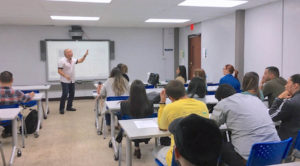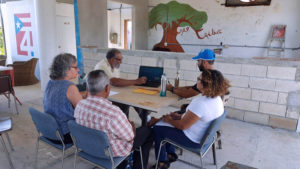Economic development scarce for P.R.’s micro and small entrepreneurs

By Jeniffer Wiscovitch Padilla
Center for Investigative Journalism
“To avoid a headache,” Wilfredo Cubero hired a professional authorized by the Permit Management Office to get the Use Permit for his business Piu Bello Gelato, located in Plaza del Sol mall in Bayamón.
His biggest setback at the moment is that he does not yet have the sanitary license required from all food businesses, because a Health Department inspector has yet to visit the business to perform the mandatory inspection.
Cubero submitted the application for the sanitary license on Oct. 23, 2018 and it was not until five months later that a Health Department inspector reached out to him for the inspection. At that time, the inspection could not be done because the area where the business is located in the shopping center was closed for remodeling. He has been waiting since March.
The businessman, who had a prior operation in Arecibo in 2016, remembered having to wait for the sanitary license, but for less time, since it took three months to be granted then.
Nelson Reyes, creator of the Incubator Model of Community Solidarity Microenterprises (iMECs, for its initials in Spanish,) said he knows many “horror stories” about the process of granting Use Permits and of small merchants from across the island who have had to wait up to six months to get it.

In his experience, Reyes — who has been training microentrepreneurs for more than 15 years — the delay in awarding the permits is that Environmental Health and the Fire Department do not have enough inspectors to issue their respective certifications. Both certifications are necessary for the Permit Management Office, which has the final say, to issue a Use Permit.
The Health Department is also in charge of granting the sanitary license to food businesses, which also requires the visit of an inspector to the establishment, as well as the issuance of labels for processed foods.
In another case interviewed by the Center for Investigative Journalism (CPI, for its initials in Spanish,) in which the small entrepreneur asked for anonymity, they paid rent without being able to operate the business for 18 months.
That’s how long it took for them to get the Use Permit and the license to sell alcoholic beverages for an establishment where cultural, community and artistic events are held.
“Six months passed after we submitted everything, with no follow-up. At the end, the Municipality of San Juan told us: ‘if you pay an intermediary, it will probably be released faster because they have accesses that you will not have’,”said the entrepreneur, who began the request online.
“In a matter of two weeks the intermediary arrived with the Use Permit in hand,” the source added. Two weeks later he received the liquor license, he said.
The CPI found a 21% drop in the number of Environmental Health inspectors in the past 10 years. Environmental Health is an agency within the Health Department whose responsibility is directed to the prevention and control of environmental problems that affect public health.
In 2012, there were 132 Environmental Health inspectors, while for 2019, the number is 104, according to information provided by the Health Department. In the case Environmental Health permits the agency has granted, there has also been a decrease: in 2015, 32,034 were granted, while so far this year it has only granted 8,881.
The Environmental Health certification is issued as part of the evaluation process of a Use Permit for any business. The endorsement of the Fire Department, Environmental Health and Categorical Exclusion are required, which certifies that a project or use will not have a significant environmental impact.
‘Progressive decrease’ in inspectors The Health Department accepted that there has been “a progressive decrease” in the number of Environmental Health inspectors, but said they are taking measures so that the service they provide can continue.
“Currently, under the Centers for Disease Control’s recovery funds we have managed, through proposals, to bring staff to boost our staff and give continuity to the different functions that our staff performs,” said Carlos J. Mercado-Ruiz, of the Environmental Health’s Deputy Office.
In relation to the decrease in permits granted, Mercado-Ruiz said, “the decreases in permits granted may be due to several factors; for example, business closures [due to remodeling or elimination,] administrative processes and/or compliance, among others.”
The Fire Department, meanwhile, currently has 83 inspectors, according to Karixia Ortiz, press spokeswoman of the Department of Public Safety.
However, José Tirado, president of the Puerto Rico United Firefighters Union, assured the CPI that there are only 70 field inspectors, and that there are 10 other employees who are supervisors and don’t do inspection work.
Tirado said in the past three years, the number of inspectors was around 100, and that the decrease is due to the freezing of job positions after firefighters retire. He mentioned that in the Ponce region there are only two inspectors, so which they have 1,500 cases past-due since last year.
“They are still issuing certifications from last year,” he said about that region.

Víctor Hugo-Rivera, executive president of the Community Development Alliance Inc., which has an incubator for community businesses, remembers a kind of “manifesto” that decorated the façade of a pizzeria in Yabucoa after Hurricane Maria hit in 2017.
The owner explained how permit problems caused him to never open its doors. Rivera, who has been supporting microentrepreneurs for five years, said he advises participants to establish in their business plans that the Use Permit, “in real terms, may take more than a year.” Also, he advises them to use authorized intermediaries.
For Jorge Argüelles-Morán, president of the United Retailers Association, the delay in the granting of Use Permits is one of the pitfalls that businesses face today. They have to make an initial investment to set up the place to meet the requirements of Environmental Health and the Fire Department. However, the inspection delay results in loss of income.
‘Single Use Permit’ promised by Rosselló a way away Gov. Ricardo Rosselló administration officials recognize the historical deficiencies of the business permit system, which is why in April 2017 the Permit Reform was amended to allegedly make the process more agile and quicker.
Two years after Rosselló-Nevares signed the amendment to the law, its most important part, the “Single Use Permit,” is still “in the testing stage.” The Single Use Permit would consolidate the certification of Fire Prevention, Environmental Health, licenses and authorizations in a single document and transaction.
Following the signing of this new version of the Permit Reform, the Unified Business Portal was created and launched in January 2018 to replace the Permit Management Office’s Unified Permit System.
The Permits Management Office, which was moved under the umbrella of the Department of Economic Development last year, manages the website. Professionals and entrepreneurs interviewed by the CPI, believe the online application is agile. The problem, however, is in the delay in the granting of permits. However, none of the CPI’s three attempts to register on the website, on different occasions and with different emails, was successful.
Economic Development and Commerce Secretary Manuel Laboy said before the arrival of the Single Permit, the changes to the Permit Reform and the economic development that would come with the Opportunity Zones and the recovery funds, they began to train inspectors.
The Treasury Department is participating in the training, since the Single Permit will include the license to sell tobacco and alcohol. He also mentioned that Economic Development has a federal government subsidy that will allow the hiring of 98 inspectors.

“For fiscal year 2019, in terms of procedures filed, adjudicated and pending at the Permit Office, a total of 50,218 procedures have been filed. At the date of the report, 44,061 had been awarded, 6,157 were pending. I think those numbers are positive,” said Laboy, referring to a Metrics Report.
Laboy said the Single Use Permit is in “a trial stage,” mainly to integrate it into the Unified Business website.
“The reason why we haven’t been able to get it out is that we’re making sure that we do the relevant tests and that the system is going to run as designed,” added Laboy.
“The Single Use Permit is one of the great bets that are within the Permit Reform to be able to consolidate a lot of certifications, licenses, different requirements that are being worked on in a fragmented way, by integrating them under a Single Use Permit,” he said.
This includes, for example, that the Use Permit will include the Environmental Health and Fire Department certification. If it is a business that needs to apply for a liquor license, it would also be within the Single Use Permit.
“We’re talking about more than 60 procedures … that today are being worked on separately, that would be worked through this Single Permit,” Laboy said.
Intermediaries or authorized professionals?
Given the delays in the granting of Use and other permits, intermediaries come into play, who according to information compiled by the CPI, can bill up to $2,000.
Laboy said he did not know if there are any regulations the intermediaries must follow. The CPI verified with several officials and experts that there is no regulation of the practice.













Hi Collaborator,
Just read about lack of inspectors and long delay in obtaining permits when selling food in PR.
Can you help me or perhaps Nelson Reyes can….if you know how to reach him.
Our PR corporation, Sea Island, Inc. is close to utilizing its license from a U.S. corporation with common ownership called Tryon Technology, Inc.
We wish to build and sell for use by a great many poor people in PR and globally who find paying jobs hard to find without highly specialized skills.
Our efforts are to provide a way to ultimately own what you see below…plant growing towers about 11’9” tall x about 23’ long x 6’ wide. Inside woven plastic coverings with holes for air that keep out some light and most big bugs and birds so that plants being grown inside using waste water from growing fish in small tanks, we produce copious amounts of small plants like lettuce, and even small tomatoes with only 1/2” of water. Small plants in 1’ square top x 1.75” long are mounted after incubation and growth to be ready to finish on the tower can be harvested in two ways: Whole tray or just currently ready to eat salad leaves, etc. Cut by hand to order from orders booked at , do we need a permit for the buyer to come to our air-conditioned kiosk parked conveniently to our customers drive home to pick-up tonight’s dinner salad to carry home in a zipped bag inside a cooled container?
Or is this extension of a mobile farmer’s market exempt from all the food, safety, environmental, or license laws concerning a transaction between grower or farmer and eater or customer? Does each small zipped plastic bag need exact i.d. verified weight, and pedigree? If 5,000 future tower owners make such sales to customers in their nearby area but all bought via internet sharing of web page, does PR have to wait until it hires many more inspectors, etc. to add to the bureaucratic-constipation already in place? If the answer is yes, our grocery store competitors will be pleased and we will export sales and towers to other parts of Central and S. America and forget the poor or hungry in PR. Imported food in PR from CA is very costly and profitable, so maybe regulators need to be hired to stop low cost competition for very fresh, cut day of sale to be eaten same day. Or is PR able to change its ways and laws that protect the high cost sellers. If so, we will sell our technology that produces food without any inorganic content. We do not want to call it by a name that needs a license and certification.
We need to know which soon. Of course, in the underground economy among the poor in PR, it may be best to just ignore the lack of inspectors and feed the hungry until the news features closings of distribution points or producers in growers back yards.
Regards,
Richard R. Tryon, President Sea Island, Inc.
I don’t understand why it takes so long and why it is necessary to have to hire an ” intermediary “. Also why can I not get utilities changed when I have leased my building and need water and electricity to work on my project before I can get inspected. The system is so backwards and convoluted that it kills businesses. If only I had been able to open and start contributing to tax base when I started my project nine months ago and still not open.